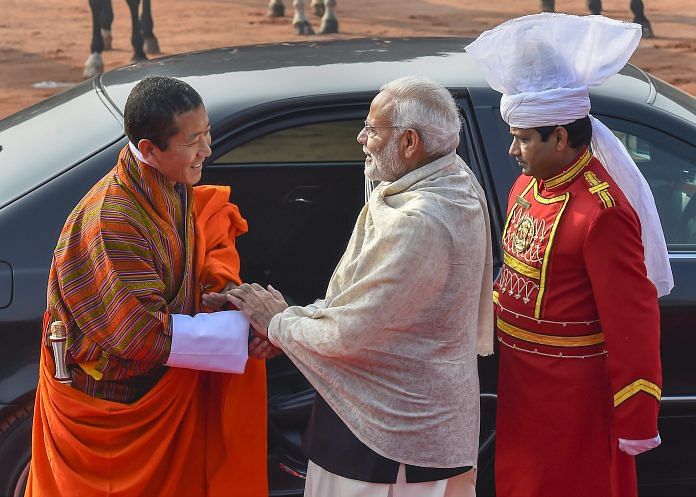New Delhi: Prime Minister Narendra Modi is embarking on a visit to Bhutan on 17 and 18 August, as India prepares to face a transformed north-eastern neighbour that is more assertive than ever.
Ties between India and Bhutan have always been more about economic engagement in terms of hydropower projects and connectivity. However, since the 2017 Doklam episode, which saw a 72-day military standoff between India and China near the tri-junction of the countries, Bhutan has also become strategically important for India in its ‘Neighbourhood First’ policy.
According to Foreign Secretary Vijay Gokhale, India and Bhutan will be “reviewing defence and security, and that includes situation along the India-Bhutan boundary”.
This will be PM Modi’s first visit to Bhutan since the Doklam standoff. However, it was the first country he had visited in his first tenure. External Affairs Minister S. Jaishankar visited the Himalayan kingdom on his first official visit after joining the cabinet at the end of May.
During the trip, Modi will also visit Simtokha Dzong, a monastery built by Ngawang Namgyal, the unifier of Bhutan. He will receive audiences with Jigme Khesar Namgyel Wangchuck, the king of Bhutan, and Jigme Singye Wangchuck, the king’s father and former king.
The PM will also meet a cross-section of members of the Bhutanese Parliament and address the Royal University of Bhutan.
Why Bhutan has changed
In October 2018, Bhutan underwent a change in leadership, with the Centre-Left Druk Nyamrup Tshogpa (DNT), which was only established in 2013, winning 30 of the national assembly’s 47 seats. New Prime Minister Lotay Tshering has already visited India twice — in December 2018 and for the Modi government’s swearing-in ceremony on 30 May.
The new Bhutan government has made it quite clear that it wants to maintain the delicate balance between India and China while asserting a new role for itself.
Despite an apparent tone of bonhomie, the Modi government is becoming rapidly uncomfortable with the fact that Bhutan is cosying up to China, something that the new generation of Bhutanese citizens also now demand.
Also read: China has quietly altered its boundary with Bhutan after Doklam stand-off with India
In fact, there is talk that both Bhutan and China may open diplomatic missions in each other’s countries. The new generation in Bhutan never really got over the fact that in 2013, India attempted to engineer a fuel crisis there by slashing subsidies on kerosene and cooking gas, as it was planning to build stronger ties with Beijing.
Modi’s visit to Bhutan also comes at a time when India is eagerly looking to have yet another informal summit meeting with Chinese President Xi Jinping in October, which is seen as a sequel to the Wuhan summit held last year.
“A visit is necessary because things are changing between India and Bhutan. Bhutan is a country that cannot be neglected and the Modi government knows that. This is a different Bhutan, so an understanding is important. The new government in Bhutan is taking a middle path when it comes to maintaining relations with India and China,” said former Indian diplomat and strategic affairs expert Phunchok Stobdan.
Economic ties to be escalated
During the visit, PM Modi will inaugurate the 720 MW Mangdechhu hydropower project, and roll out RuPay cards in Bhutan.
However, Bhutan has not made it clear whether it wants to remain a part of India’s ambitious connectivity plan that was conceptualised by the UPA government and rolled out in Modi’s first term — the Bangladesh-Bhutan-India-Nepal Motor Vehicle Agreement (BBIN-MVA). In 2017, Bhutan had withdrawn from the pact citing ecological and environmental concerns. However, the new government in Bhutan is yet to make its stand clear on this.
Bhutan is also concerned about the rising trade deficit with India. It is now keen on having more market access in India, and is looking for opportunities to export power to other countries.
“India has to now prepare to face a modern and more assertive Bhutan, and accordingly change its approach by elevating economic ties. India can begin by giving more market access to Bhutanese goods under the Bay of Bengal framework,” said Prabir De, professor at the Research and Information System for Developing Countries (RIS), a policy research institute based in Delhi, where he also serves as the coordinator of the ASEAN-India Centre.
“India should also be more sensitive towards the growth of mountain economy and trans-Himalayan regional arrangements.”
Also read: Year and a half later, Doklam has only reinforced India’s stature in Bhutan




Indian foreign policy still views the neighbourhood largely in geopolitical terms. It does not adequately factor in the gravitational field the Chinese economy is generating, through merchandise trade, investments, even tourism. On Article 370, it has induced Bhutan, Maldives, Sri Lanka to endorse our stand. Nepal is holding out. However, on the more consequential decision whether or not to participate in BRI, not one neighbour is willing to side with us. These are matters of economic self interest where the growing asymmetry between India and China is most keenly felt. 2. Hydro electric power is a valuable resource for Nepal and Bhutan. Despite early mover advantage, India has failed to capitalise on the opportunities, leading to mutual recrimination. A more pragmatic approach is required.